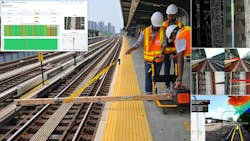Transit Tech Lab releases results from 2025 proof-of-concept phase
The Transit Tech Lab has published the results from its 2025 proof-of-concept phase. During the course of the eight-week phase that began in May 2025, 12 companies worked closely with New York-area transit agencies to test their technology solutions for improving the ridership experience and optimizing the inspection and maintenance processes of the transit systems in the tri-state area.
According to Transit Tech Lab, which was founded by the Partnership Fund for New York City and Metropolitan Transportation Authority (MTA), results highlight how the participating companies used technology to streamline complex processes, improve operational responsiveness and significantly enhance operational efficiency, safety and cost savings for the partner agencies, which include the MTA, the Port Authority of New York and New Jersey and the New York City (NYC) Department of Transportation.
Transit Tech Lab says the two challenge areas — Ridership Improvement and Inspection and Maintenance — were revealed in January and generated 112 applications from around the world.
Ridership Improvement Challenge
NYC regional transit agencies are looking at ways they can accurately measure, capture and improve paid ridership and travel demand data to optimize transit schedules and communicate effectively.
Finalists include Jawnt, Libelium Comunicaciones and Matawan. The companies worked with agency partners to:
- Redesign paper-based workflows to accelerate contactless fare payment adoption.
- Use real-time sensors to monitor crowding and inform train schedules.
- Integrate large-scale fare data to optimize transit planning.
Inspection and Maintenance Challenge
NYC regional transit agencies are looking at ways to digitize manual inspections and optimize maintenance processes.
Finalists include Censys Technologies, FlipAI, Kinexio, Previsico, Routora, SafetyCulture, SahayAI, Tomorrow.io and TwinKnowledge. The companies worked with agency partners to:
- Utilize artificial intelligence-powered tools to accelerate inspections, data analysis and document review.
- Digitize user-friendly workflows that reduce manual labor, drive time for [what] and administrative overhead.
- Produce predictive systems that improve weather forecasting and operations response.
Transit Tech Lab notes that this year, the program hosted global companies based in France, Australia, Spain and the United Kingdom, as well as companies from across the United States. This is the seventh annual program of the Transit Tech Lab. Previous challenges focused on improving subway signaling, transit accessibility, resiliency and customer experience. Since the program’s inception in 2018, over 1,000 companies have applied to participate in the program, 81 companies have tested their technologies and 29 solutions have commercially scaled or informed commercial procurements.
The full report can be found at Transit Tech Lab's website.
